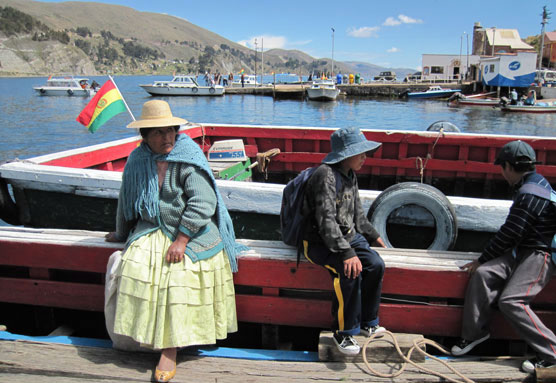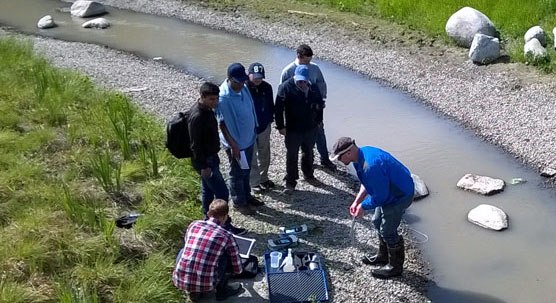Press release 2017-03-14 at 9:23

Local people at the lake Titicaca in Bolivia. © Johanna Korhonen, SYKE
Finnish experts helped countries in the Andes region to develop their water, climate and weather services. Due to their geographical location, Bolivia, Ecuador, Colombia and Peru are vulnerable to climate change. Over the course of the multi-year project, progress was made in cooperation between the countries and in their authorities’ preparedness for issuing warnings on natural risks and damage.
The Finnish Environment Institute (SYKE) participated in the project by training and supporting the countries’ hydro-meteorological institutes. "In the PRASDES project, improvements were made to the information exchange and management practices of the authorities responsible for services, thus improving the countries’ preparedness to provide warnings on the risks brought by climate change," explains Project Manager Johanna Korhonen from the Finnish Environment Institute. A specific goal was to create early warning and risk management services for vulnerable communities in three pilot regions which were all located in transboundary river basins.
Improvements to cooperation between countries and preparedness to offer hydrological services
The Andes countries have not before exchanged hydrological observation data with each other. The countries needs for cross-border information are now better met by the regional observation database and a new software for exchanging hydrological data, which were both developed in the project. Encouraging examples provided to the countries’ hydro-meteorological institutes included SYKE’s open data policy, its long-term experience of working with transboundary river basins and the joint Flood Centre service run by SYKE and the Finnish Meteorological Institute.
The Flood Centre provides national flood forecasts and flood warnings and maintains the national overview data for water and flooding in Finland. Combining the professional skills of both meteorologists and hydrologists is especially helpful for flood warnings, and Finland's example shows concretely the benefits brought by inter-institutional cooperation.
When the project began, there was only limited skills and experience in hydrological modelling in the chosen pilot areas. The automated weather stations and hydrological observation stations set up in these regions enabled real-time water system forecasts and the development of a flood warning system. The stations provide data for both the hydrological institutes and also the local authorities, who are responsible for emergency measures and disseminating information within the village communities.

Hydrologists from the Andes also made a field trip to Finland. © Johanna Korhonen, SYKE
Flood map offers new possibilities in one pilot region
The project produced the first flood map for the municipality of Escoma, located on the River Suches in Bolivia. The flood-prone Escoma suffered in March 2016 the worst flood ever recorded in the region. SYKE’s flood map training was organised only after the flood, but with the help of the map created for the region, future flood damage can be minimised and locals can be informed about risk areas.
International demand for Finnish meteorological and hydrological expertise
"SYKE’s task was to bring expertise to the region, especially for the development of hydrological services that cover the whole process from observations and measurements to information systems, modelling and final products," explains Project Manager Johanna Korhonen. During the project, SYKE held many trainings and workshops. A large number of the trainings were done using open and free software so that their use in the countries concerned would continue to be economically viable in the future as well.
"The project showed that there is a lot of international demand for Finnish meteorological and hydrological expertise. Even through the geographical conditions are different, the challenges faced throughout the world are very much the same," says Head of International Affairs Tea Törnroos from the Finnish Environment Institute.
The regional PRASDES project (an acronym of the project’s Spanish name – Programa Regional Andino para el fortalecimiento de los Servicios meteorológicos, hidrológicos, climáticos y el DESarrollo) was funded by development aid from the Finnish Ministry for Foreign Affairs between 2013 and 2016. The project was coordinated by the El Niño research institute CIIFEN (Centro Internacional para la Investigación del Fenomeno de El Niño) in Ecuador. Partnering in the project were the hydro-meteorological institutes of Bolivia, Ecuador, Colombia and Peru. The Finnish Meteorological Institute participated in developing the project’s weather services.
More information:
Project Manager Johanna Korhonen, Finnish Environment Institute
tel. +358 295 251 302, firstname.lastname@ymparisto.fi
Head of International Affairs Tea Törnroos, Finnish Environment Institute
tel. +358 295 251 714, firstname.lastname@ymparisto.fi